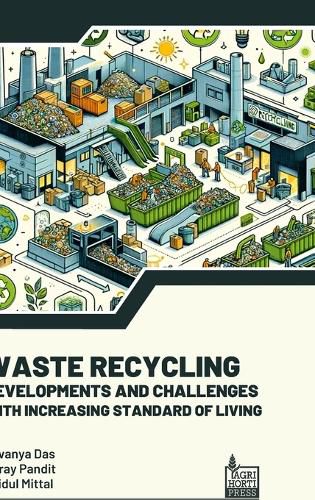Readings Newsletter
Become a Readings Member to make your shopping experience even easier.
Sign in or sign up for free!
You’re not far away from qualifying for FREE standard shipping within Australia
You’ve qualified for FREE standard shipping within Australia
The cart is loading…






1.Technological Innovations: Explore advancements in waste recycling technologies, such as mechanical sorting, chemical processes, and biological treatment methods, enabling more efficient and cost-effective recycling of various waste streams.
2.Circular Economy Initiatives: Discuss the shift towards a circular economy model, where waste is viewed as a valuable resource to be reused, recycled, and repurposed, reducing the reliance on finite raw materials and minimizing environmental impact.
3.Waste-to-Energy Solutions: Examine waste-to-energy technologies, including incineration, anaerobic digestion, and gasification, which convert waste into heat, electricity, or biofuels, contributing to renewable energy generation and resource recovery
4.Sustainable Packaging and Design: Address the importance of sustainable packaging materials and product design in reducing waste generation, promoting recyclability, and minimizing environmental footprint throughout the product lifecycle.
5.Extended Producer Responsibility (EPR): Discuss EPR policies and regulations that hold producers responsible for the end-of-life management of their products, incentivizing design for recyclability, waste reduction, and responsible disposal practices.
6.Infrastructure Development: Address the need for investment in waste management infrastructure, including recycling facilities, collection systems, and transportation networks, to support increased recycling rates and accommodate growing waste volumes.
7.Policy and Regulatory Challenges: Examine regulatory challenges and policy barriers to effective waste recycling, including inconsistent regulations, lack of enforcement mechanisms, and economic disincentives, and discuss potential solutions to overcome these challenges.
$9.00 standard shipping within Australia
FREE standard shipping within Australia for orders over $100.00
Express & International shipping calculated at checkout
1.Technological Innovations: Explore advancements in waste recycling technologies, such as mechanical sorting, chemical processes, and biological treatment methods, enabling more efficient and cost-effective recycling of various waste streams.
2.Circular Economy Initiatives: Discuss the shift towards a circular economy model, where waste is viewed as a valuable resource to be reused, recycled, and repurposed, reducing the reliance on finite raw materials and minimizing environmental impact.
3.Waste-to-Energy Solutions: Examine waste-to-energy technologies, including incineration, anaerobic digestion, and gasification, which convert waste into heat, electricity, or biofuels, contributing to renewable energy generation and resource recovery
4.Sustainable Packaging and Design: Address the importance of sustainable packaging materials and product design in reducing waste generation, promoting recyclability, and minimizing environmental footprint throughout the product lifecycle.
5.Extended Producer Responsibility (EPR): Discuss EPR policies and regulations that hold producers responsible for the end-of-life management of their products, incentivizing design for recyclability, waste reduction, and responsible disposal practices.
6.Infrastructure Development: Address the need for investment in waste management infrastructure, including recycling facilities, collection systems, and transportation networks, to support increased recycling rates and accommodate growing waste volumes.
7.Policy and Regulatory Challenges: Examine regulatory challenges and policy barriers to effective waste recycling, including inconsistent regulations, lack of enforcement mechanisms, and economic disincentives, and discuss potential solutions to overcome these challenges.